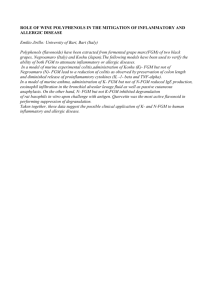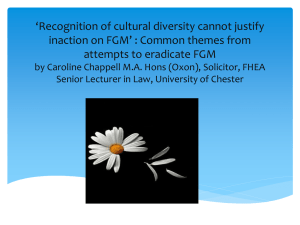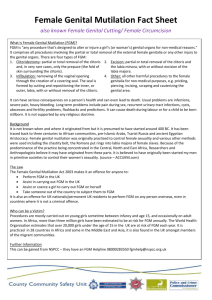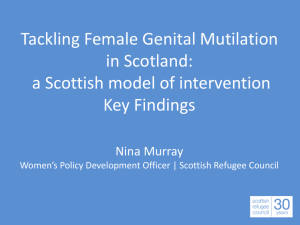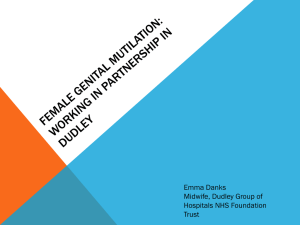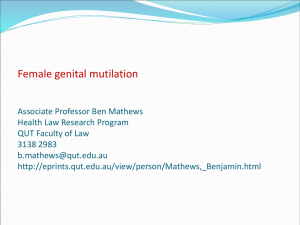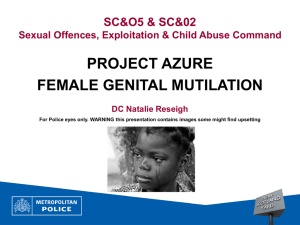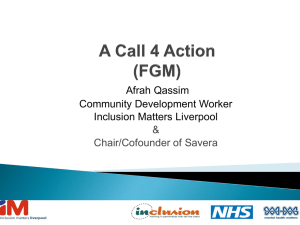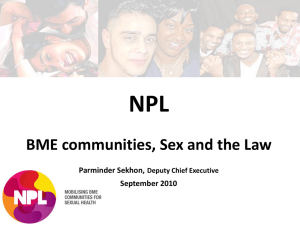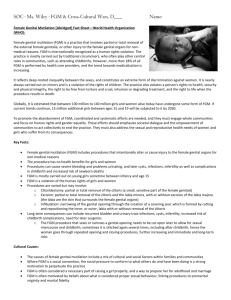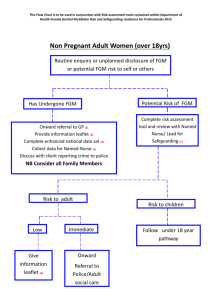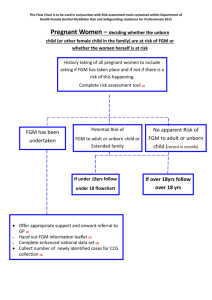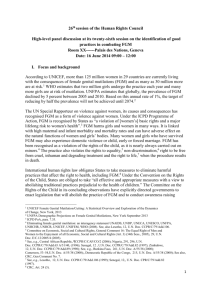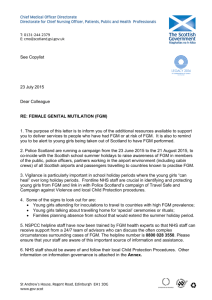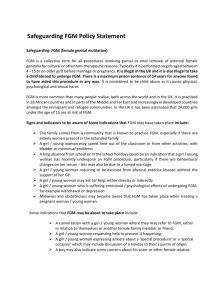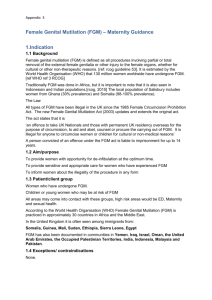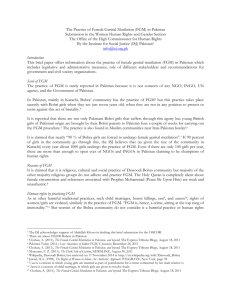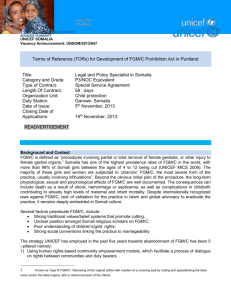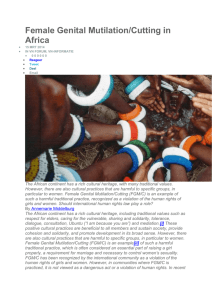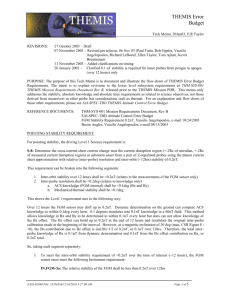Safeguard Guide No 2 Female Genital Mutilation
advertisement
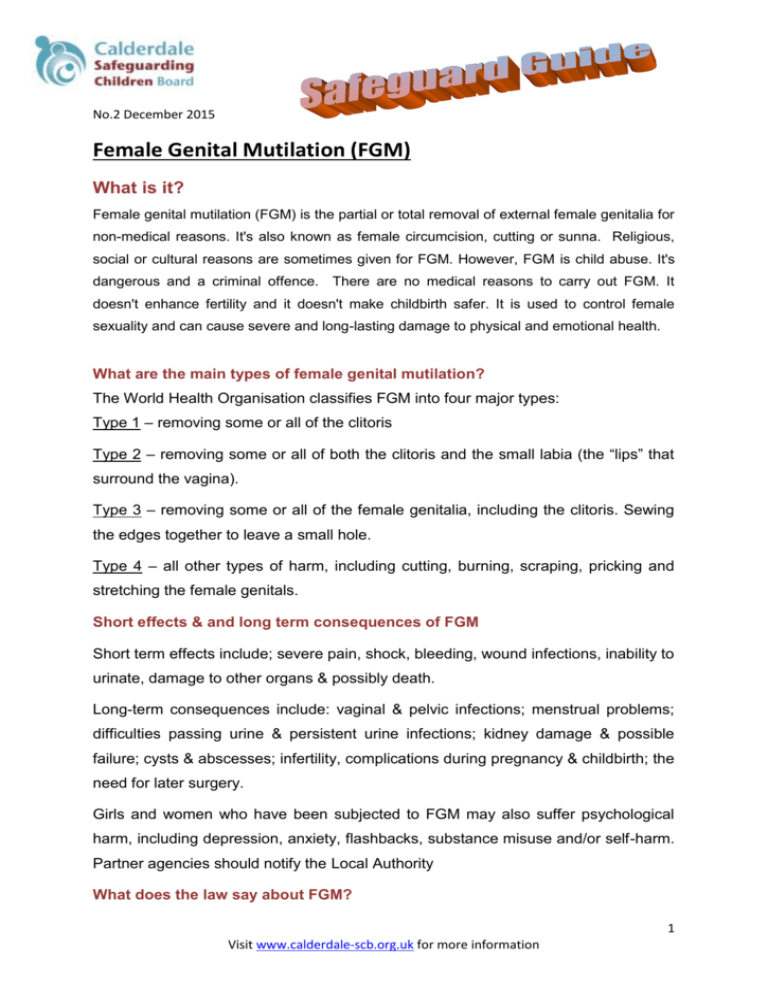
No.2 December 2015 Female Genital Mutilation (FGM) What is it? Female genital mutilation (FGM) is the partial or total removal of external female genitalia for non-medical reasons. It's also known as female circumcision, cutting or sunna. Religious, social or cultural reasons are sometimes given for FGM. However, FGM is child abuse. It's dangerous and a criminal offence. There are no medical reasons to carry out FGM. It doesn't enhance fertility and it doesn't make childbirth safer. It is used to control female sexuality and can cause severe and long-lasting damage to physical and emotional health. What are the main types of female genital mutilation? The World Health Organisation classifies FGM into four major types: Type 1 – removing some or all of the clitoris Type 2 – removing some or all of both the clitoris and the small labia (the “lips” that surround the vagina). Type 3 – removing some or all of the female genitalia, including the clitoris. Sewing the edges together to leave a small hole. Type 4 – all other types of harm, including cutting, burning, scraping, pricking and stretching the female genitals. Short effects & and long term consequences of FGM Short term effects include; severe pain, shock, bleeding, wound infections, inability to urinate, damage to other organs & possibly death. Long-term consequences include: vaginal & pelvic infections; menstrual problems; difficulties passing urine & persistent urine infections; kidney damage & possible failure; cysts & abscesses; infertility, complications during pregnancy & childbirth; the need for later surgery. Girls and women who have been subjected to FGM may also suffer psychological harm, including depression, anxiety, flashbacks, substance misuse and/or self-harm. Partner agencies should notify the Local Authority What does the law say about FGM? 1 Visit www.calderdale-scb.org.uk for more information No.2 December 2015 FGM is illegal and must never be carried out either here or abroad. It is also illegal to help someone to carry out FGM in any way. Anyone found guilty of this faces up to 14 years in prison. It is an offence to arrange for a child to be taken abroad for FGM, and for UK nationals or permanent UK residents to abet, counsel, procure or undertake FGM abroad, even in countries where the practice is legal. What should practitioners do? Practitioners, particularly those working in schools and in health services should also be aware of and consider potential indictors that FGM may be taking place, or has already taken place, such as: Preparations for the child to take a long holiday - arranging vaccinations or planning an absence from school; A change in the child’s behaviour after a prolonged absence from school, including; being withdrawn; crying or being away from class for long periods; The child has bladder or menstrual problems, and/ or may have difficulty walking, sitting or standing. Persons working in “regulated professions” (healthcare professionals, teachers and social workers) are required to notify the police if they discover that an act of FGM appears to have been carried out on a girl under 18 years of age. For more information West Yorkshire Police: 101 and referral form: LINK Calderdale Multi Agency Screening Team 01422 393336 West Yorkshire Procedures: http://westyorkscb.proceduresonline.com/chapters/p_fem_gen_mut.html You can also find details of specialist FGM clinics and services at www.nhs.uk/fgm Department of Health leaflet about FGM (PDF, 248Kb) - other language formats are available to download from http://www.nhs.uk/NHSENGLAND/ABOUTNHSSERVICES/SEXUALHEALTH-SERVICES/Pages/fgm-resources.aspx 2 Visit www.calderdale-scb.org.uk for more information
